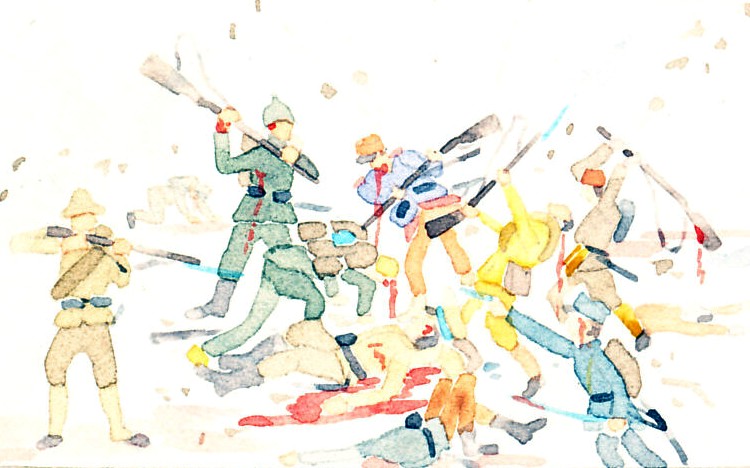The advance of the 7th Reserve Division, part of the 4th Reserve Corps and of von Kluck's First Army, from Germany thru Belgium and northern France in August and September 1914, showing von Kluck's turn to the southeast away from Paris and exposure of his right flank to the French counterattack from the city. The 7th Division played a part in the Battles of the Marne and the Ourcq. The Division suffered heavily on September 6 and 7.

Vormarsch der 7. Reserve-Division durch Belgien u. Nordfrankreich im August u. September 1914.
Marsch durch Belgien vom 17-25.8 = 213 klm. in 8 1/2 Tagen.
Marsch bis vor Paris vom 25.8-7.9 = 294 klm. in 12 1/2 Tagen.
Marsch zur Aisne vom 9.9-11.9 = 49 klm. in 3 Tagen
Gesamtstrecke = 556 klm. in 24 Tagen.
Kampftage:
26.8 Wambaix
5.9 Monthyon
6.9 Puisieux
7-9.9 Le Plessis-Placy
13. u. 20.9 Nouvron
Advance of the 7th Reserve Division through Belgium and northern France in August and September 1914.
Through Belgium from August 17-25 = 213 klm. in 8 1/2 days.
Before marching to Paris from August 25 to September 7 = 294 klm. in 12 1/2 days.
March to the Aisne from September 9-11 = 49 klm. in 3 days
Total distance = 556 klm. in 24 days.
Battle Days:
August 26 Wambaix
September 5 Monthyon
September 6 Puisieux
September 7-9 Le Plessis-Placy
September 13 and 20 Nouvron
Other views:
Front, Larger
